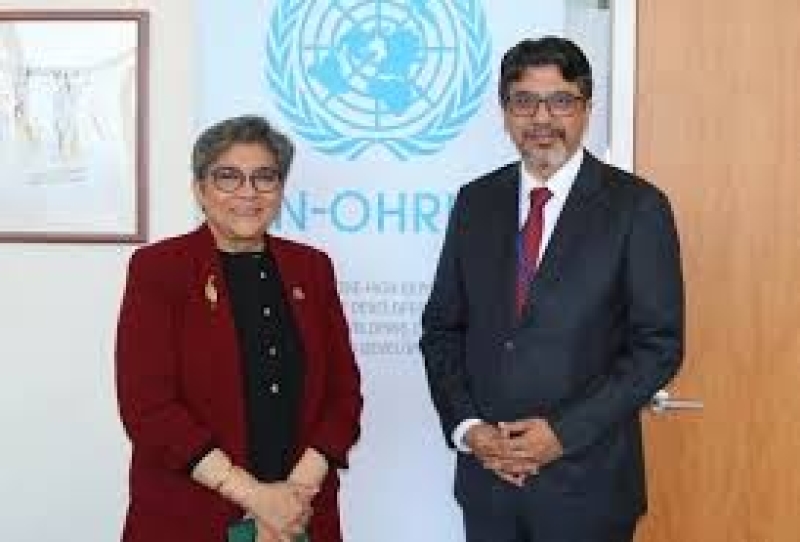- AI Moves Closer To Decoding Human Thoughts |
- UNESCO Calls Iran School Strike Grave Violation |
- Oil Jumps, Asian Stocks Slide On Gulf Tensions |
- Death toll from central Israel strike rises to 5 |
- DSE sinks 138 points on broad sell-off; CSE also tumbles |
Bangladesh Foreign Secretary Talks Reforms and Climate at UN

Bangladesh’s Foreign Secretary Md Jashim Uddin and Li Junhua
Bangladesh’s Foreign Secretary, Ambassador Md Jashim Uddin, conducted high-level meetings with senior UN officials in New York today, addressing vital economic reforms, climate challenges, and the country’s impending transition from Least Developed Country (LDC) status.
During a discussion with UN Under-Secretary-General for Economic and Social Affairs, Li Junhua, Ambassador Uddin detailed Bangladesh's ongoing reform initiatives under the Interim Government, aligning with the aspirations of the recent "July-August Revolution." He emphasized the need for robust UN technical and policy support to enhance governance, accountability, and transparency, reinforcing the enduring partnership between Bangladesh and the UN.
A central topic of conversation was Bangladesh’s pursuit of recovering stolen assets and tackling illicit financial flows, with Uddin calling for enhanced UN collaboration on these pressing issues. He also underscored the importance of sustained international support as Bangladesh prepares for its LDC graduation, stressing the necessity of a seamless transition.
In light of global economic challenges, particularly the repercussions of the COVID-19 pandemic and ongoing conflicts, Ambassador Uddin urged for intensified UN support in achieving the Sustainable Development Goals (SDGs). He welcomed the recent Bangladesh-led UN General Assembly resolution designating May 6 as Rural Development Day, highlighting the UN Department of Economic and Social Affairs (DESA) as the implementing body.
Junhua responded positively, commending Bangladesh’s leadership within the Second Committee of the UN General Assembly. He assured support for capacity-building, digital governance, and other reform areas, framing LDC graduation as a fresh opportunity for continued preferential arrangements. He also emphasized the significance of the upcoming Fourth International Conference in 2025, aimed at rejuvenating global development assistance through innovative financing and reforming international financial institutions.
Earlier, the Foreign Secretary met with Selwin Charles Hart, the UN Secretary General’s Special Adviser on Climate Action and Just Transition. During their dialogue, Ambassador Uddin reiterated Bangladesh’s call for full implementation of the Paris Agreement, particularly regarding climate finance commitments. As one of the world’s most climate-vulnerable countries, he outlined the severe risks Bangladesh faces from climate-induced displacement, calling for urgent global action.
Ambassador Uddin also noted that Bangladesh’s National Adaptation Plan is projected to require approximately USD 230 billion by 2050, urging for increased support in climate financing, especially for adaptation initiatives. Hart praised Bangladesh’s leadership in climate discussions, emphasizing the necessity for enhanced cooperation on resilience-building efforts ahead of COP29.
Additionally, the Foreign Secretary met with Rabab Fatima, UN High Representative for LDCs, LLDCs, and SIDS, where they discussed UN support for Bangladesh's reform agenda, LDC graduation, and the increased representation of Bangladeshi nationals in UN policy roles.
These meetings highlight Bangladesh’s proactive engagement with the UN as it tackles critical global challenges, from economic reform to climate action, positioning itself for a resilient post-LDC future.

